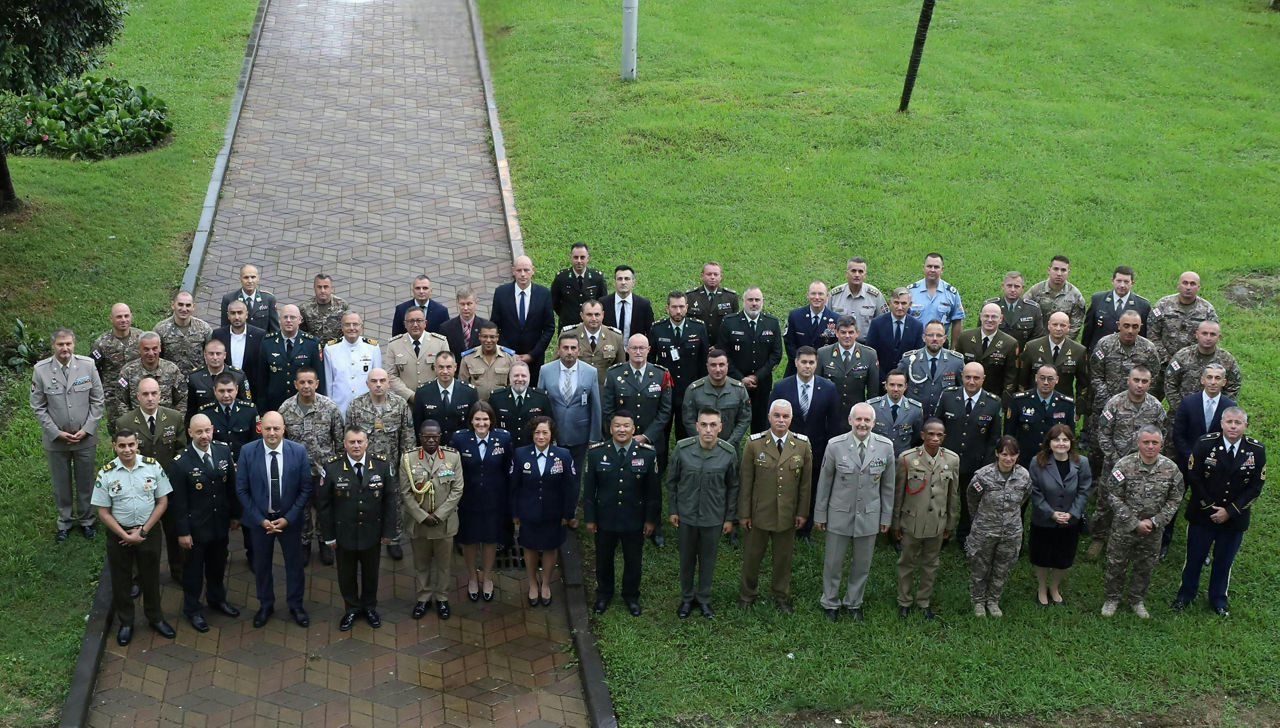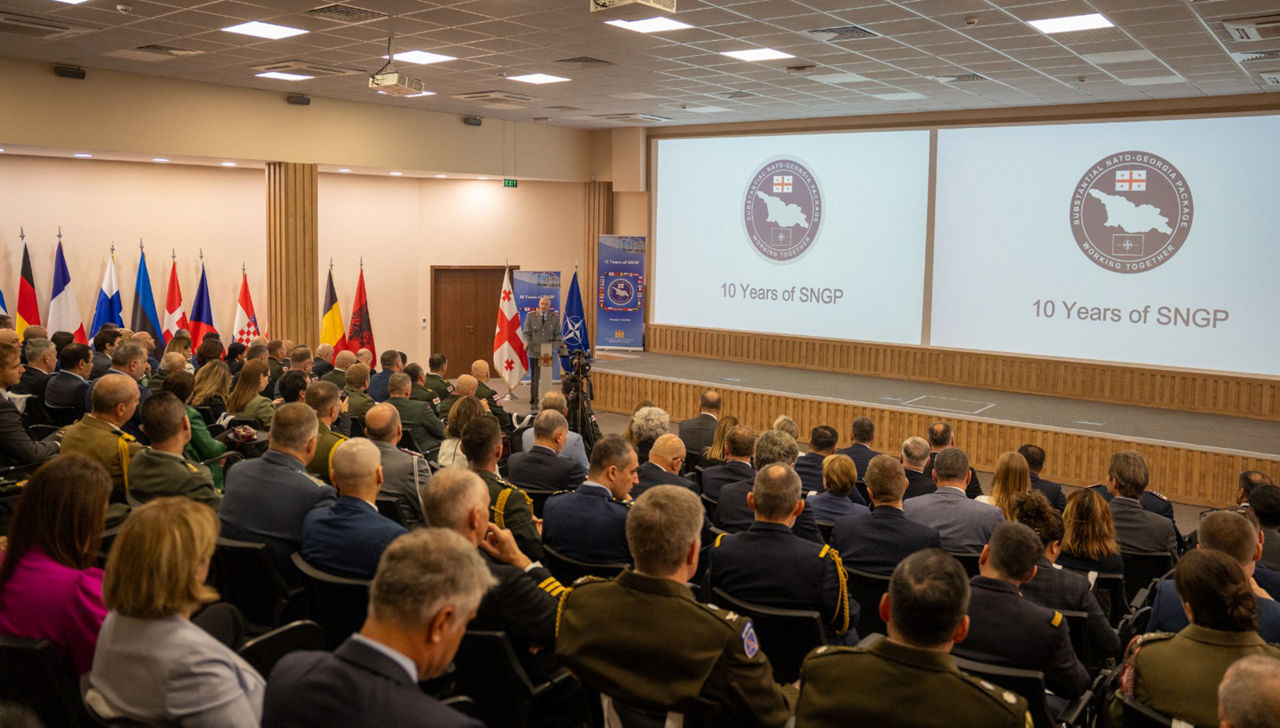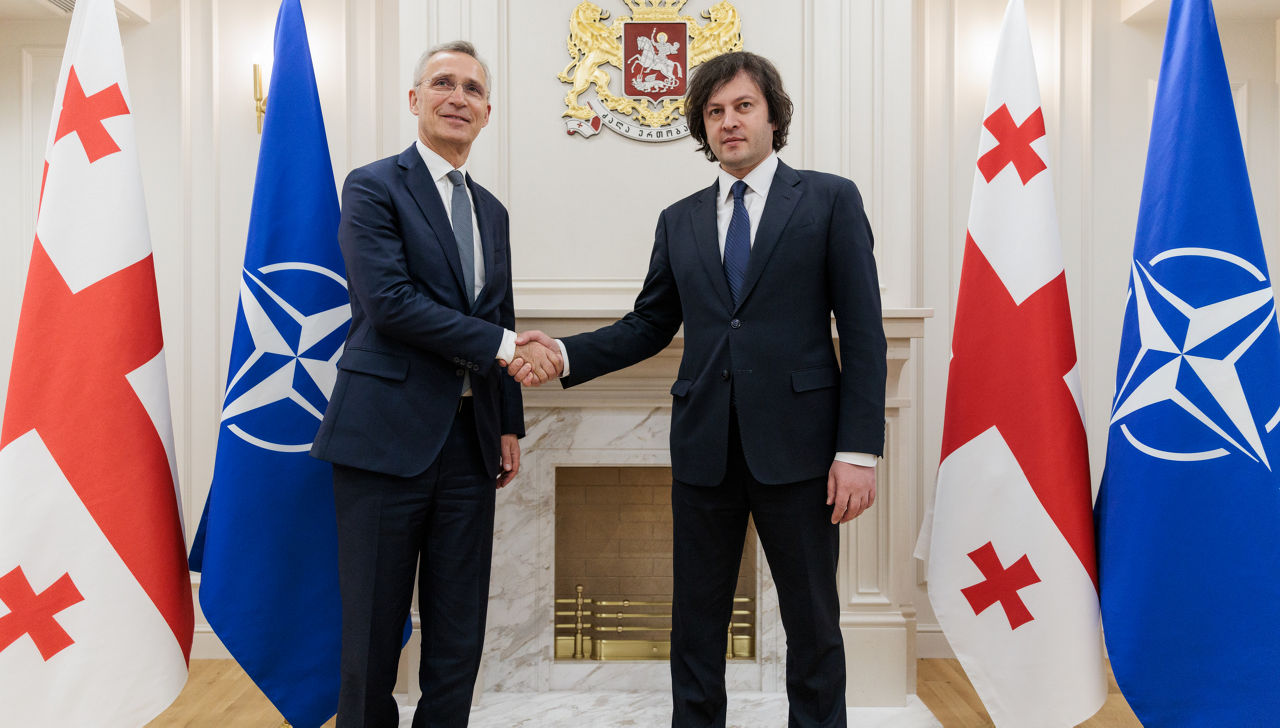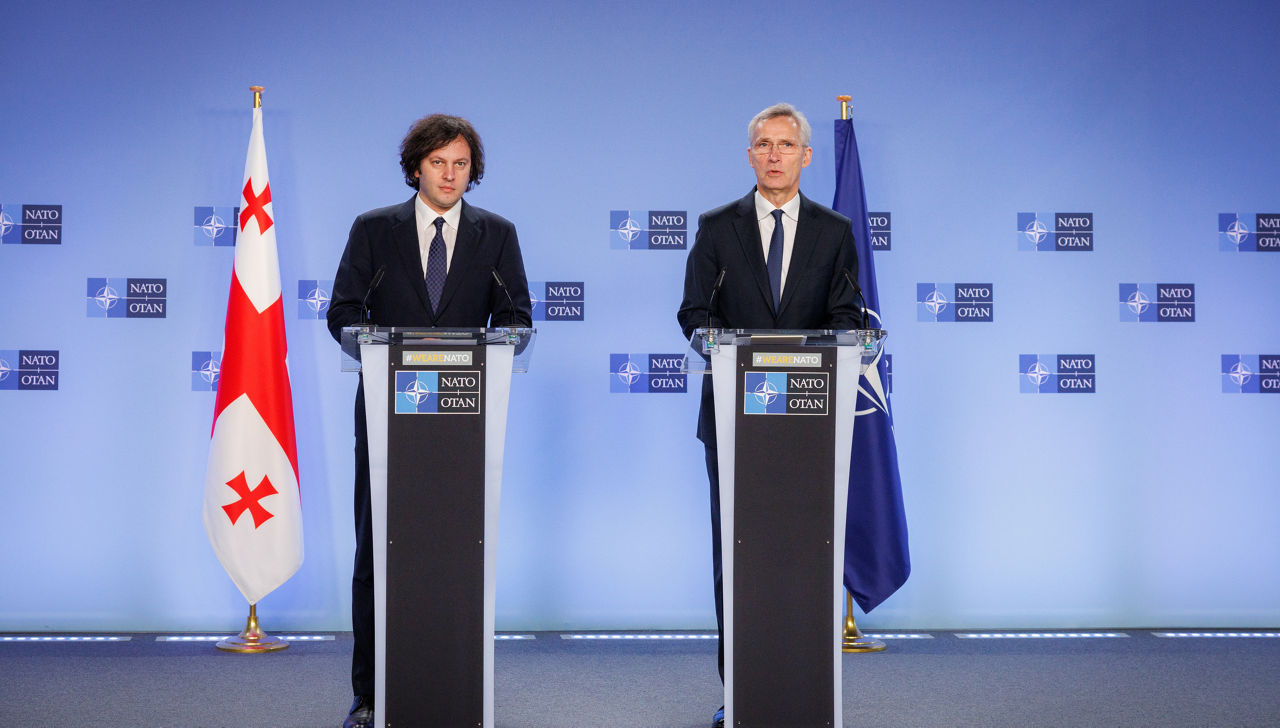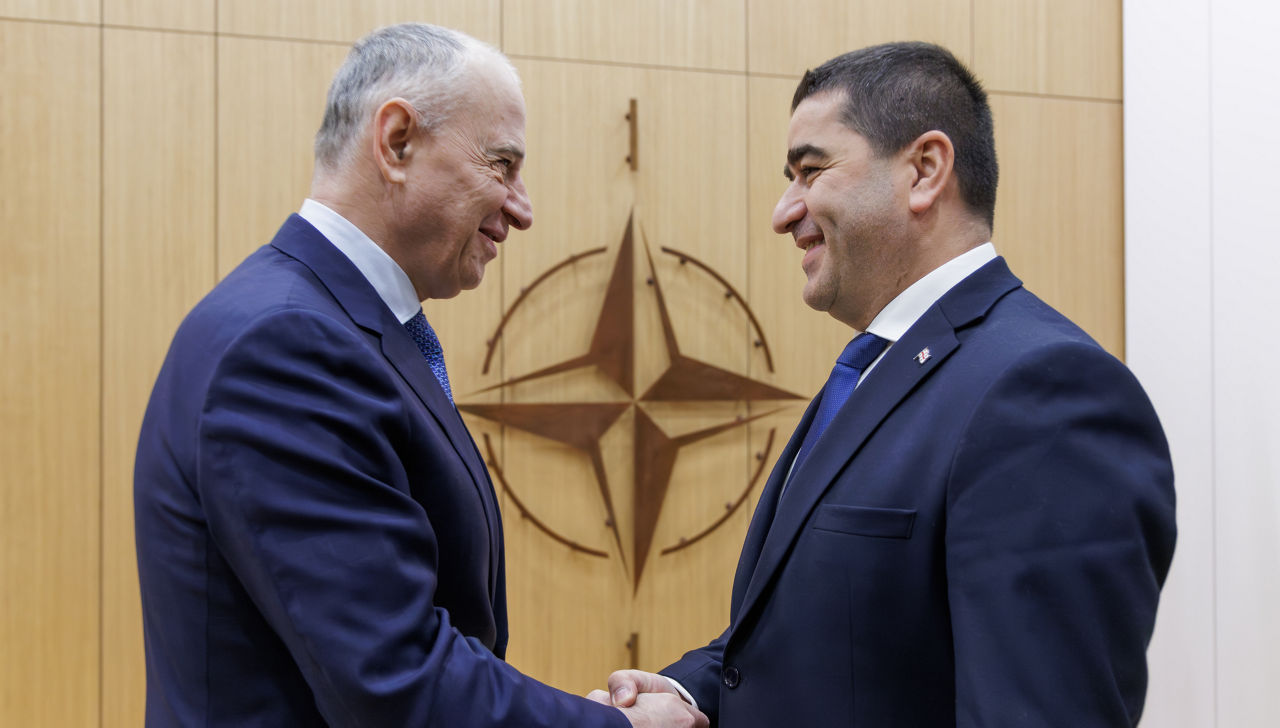Download NATO’s broadcast-quality video content free of charge

Log in
NATO MULTIMEDIA ACCOUNT
Access NATO’s broadcast-quality video content free of charge

Check your inbox and enter verification code
You have successfully created your account
From now on you can download videos from our website
Subscribe to our newsletter
If you would also like to subscribe to the newsletter and receive our latest updates, click on the button below.
Enter the email address you registered with and we will send you a code to reset your password.
Didn't receive a code? Send new Code
The password must be at least 12 characters long, no spaces, include upper/lowercase letters, numbers and symbols.
Your password has been updated
Click the button to return to the page you were on and log in with your new password.
Relations with Georgia
Updated: 09 May 2025
Georgia is one of NATO’s closest partners. It aspires to join the Alliance. Over time, a broad range of practical cooperation has developed between NATO and Georgia, supporting Georgia’s reform efforts and its goal of eventual NATO membership. The country contributes to the NATO-led Operation Sea Guardian and cooperates with the Allies and other partner countries in many other areas.
- Georgia regained independence in 1991. The following year, NATO established relations with the country when it joined the North Atlantic Cooperation Council. This forum for dialogue was succeeded in 1997 by the Euro-Atlantic Partnership Council, which brings together all Allies and partner countries in the Euro-Atlantic area.
- Practical bilateral cooperation started when Georgia joined the Partnership for Peace (1994) and deepened after the “Rose Revolution” in 2003, when a new government pushed for more ambitious reforms.
- Allies agreed at the NATO Summit in Bucharest in April 2008 that Georgia will become a NATO member, provided it meets all necessary requirements. This decision has since been reconfirmed at successive NATO summits. The Alliance stands firm in its support for Georgia’s right to decide its own future and foreign policy, free from outside interference.
- Since Russia’s invasion of Georgian territory in August 2008, the Allies have continued to express their support for Georgia’s territorial integrity and sovereignty within its internationally recognised borders. The Alliance calls on Russia to withdraw the forces it has stationed in Georgia without its consent and to reverse its recognition of the Abkhazia and South Ossetia regions of Georgia as independent states.
- Since 2008, the NATO-Georgia Commission (NGC) provides the framework for close political dialogue and cooperation in support of reform efforts and Euro-Atlantic aspirations. Preparations for eventual membership are taken forward through the development and implementation of successive Annual National Programmes. In July 2018, Heads of State and Government met with Georgia and adopted a Declaration that marked the NGC’s tenth anniversary.
- At the 2014 NATO Summit in Wales, the Substantial NATO-Georgia Package (SNGP) of measures was launched to strengthen Georgia’s ability to defend itself and advance its preparations for membership. A refreshed SNGP, with new timelines and updated ambitions, was adopted in December 2020.
- At the 2022 Madrid Summit, Allies endorsed a set of tailored support measures for Georgia, as one of NATO’s partners most directly affected by external threats and interference in the current security environment resulting from Russia’s war of aggression against Ukraine.
- The NATO Liaison Office was established in Georgia in 2010 to support the country’s reform efforts and its programme of cooperation with NATO.
- The NATO Secretary General's Special Representative for the Caucasus and Central Asia (currently vacant) is responsible for the overall coordination of NATO’s partnership policy in these two regions.
Key areas of cooperation
Georgia's cooperation with NATO is mutually beneficial and includes:
Building capabilities and interoperability
Substantial NATO-Georgia Package (SNGP)
The Substantial NATO-Georgia Package (SNGP) is the main vehicle for practical cooperation between Georgia and NATO. First launched in 2014, the package aims to strengthen Georgia's defence capabilities in line with NATO standards and help Georgia advance in its preparations for eventual NATO membership.
The Substantial NATO-Georgia Package aims to support the following objectives:
- to act as a catalyst for the implementation of Georgia's defence reforms;
- to enhance Georgia's interoperability with NATO;
- to support Georgia's efforts to contribute to Euro-Atlantic security;
- to enhance accountability and transparency;
- to enhance Georgia's resilience;
- to enhance Georgia's interagency coordination and interaction; and
- to bring Georgia closer to the Alliance.
In 2020, a thorough review was conducted by NATO together with the Georgian Foreign Affairs, Defence and Interior Ministries, as well as with the Georgian Defence Forces and the Coast Guard. This review led to an upgraded Substantial NATO-Georgia Package, which was endorsed by Foreign Ministers in December 2020. The upgraded package encompasses multiple domains (air, land, sea) and includes support activities at the tactical, operational and strategic levels, including conducting regular joint NATO-Georgia exercises.
The upgraded SNGP currently consists of 12 initiatives, three of which were added in 2020. These three initiatives are meant to support Georgia in the development of a deployable military medical capacity; to improve Georgia's English language training capacity; and to improve the codification and standardization system, which will ensure an even higher level of interoperability of new Georgian defence projects and programmes with NATO requirements.
The level of ambition for ongoing initiatives has also been increased, including through the NATO-Georgia Joint Training and Evaluation Centre and the Defence Institution Building School. The Joint Training and Evaluation Centre in Georgia hosts live and simulated training exercises and certification for military units from Allied and partner countries. The most recent NATO-Georgia exercise took place in March 2022 and the next one is scheduled to be held in Spring 2025. Allies have provided the funding for a number of vehicles for the Centre.
Tailored support measures following Russia’s war on Ukraine
At the 2022 Madrid Summit, Allies endorsed a set of tailored support measures for Georgia, as one of NATO’s partners most directly affected by external threats and interference in the current security environment resulting from Russia’s war of aggression against Ukraine.
These measures step up both political and practical support to Georgia. The political measures aim to intensify the dialogue between Georgia and NATO. The practical measures aim to help Georgia accelerate its transition from Soviet-era equipment to equipment meeting today’s NATO standards, and enhance Georgia’s situational awareness.
Other initiatives
First launched in 2009, a Professional Development Programme for civilian personnel is strengthening the capacity for democratic management and oversight in the Defence Ministry and other security sector institutions.
Georgia participates in the Building Integrity initiative, which provides practical assistance and advice for strengthening integrity, accountability and transparency in the defence and security sector. Georgia is also engaged with NATO’s Defence Education Enhancement Programme, which aims to improve education and training within Georgia’s National Defence University and Military Academy.
Georgia is one of four countries that have enhanced opportunities for dialogue and cooperation with the Allies (known as 'Enhanced Opportunity Partners') in recognition of their particularly significant contributions to NATO operations and other Alliance objectives. The other Enhanced Opportunity Partners are Australia, Jordan and Ukraine.
Georgia is also building capabilities and interoperability through participation in the Partner Augmentation Forces to NATO (PAF-N). Prior to this, between 2015 and 2024, Georgia declared units to the NATO Response Force.
Support for NATO-led operations
- Georgia participated in Operation Active Endeavour, a counter-terrorist maritime surveillance operation in the Mediterranean Sea, primarily through intelligence exchange. Since 2016, the country has supported maritime situational awareness in the context of maritime Operation Sea Guardian in the Mediterranean.
- Georgia contributed troops to the Kosovo Force (KFOR) from 1999 to 2008, providing a company-sized unit as part of the German brigade and an infantry platoon within a Turkish battalion task force.
- Georgia was one of the largest non-NATO troop contributors to the International Security Assistance Force in Afghanistan, which completed its mission in 2014. It also was one of the top overall contributors to the follow-on Resolute Support Mission (2015-2021) to train, advise and assist the Afghan forces.
Wider cooperation
- A number of Trust Fund projects supported by individual Allies and partner countries have helped Georgia to safely dispose of stockpiles of surplus and obsolete weapons and munitions, and to clear mines and unexploded munitions including from the ammunition depot at Skra (near Gori).
- Georgia is strengthening its national civil preparedness and resilience with the support of NATO. Practical cooperation with the Euro-Atlantic Disaster Response Coordination Centre (EADRCC) is also enhancing crisis management capabilities and interoperability, allowing Georgia to contribute to numerous international disaster relief efforts. The EADRCC has coordinated assistance to Georgia following an earthquake and forest fires.
- Georgia has been actively engaged in the Science for Peace and Security Programme since 1994. Activities led by Georgia have addressed a broad range of challenges, notably in the fields of environmental and energy security, counter-terrorism, cyber defence, defence against chemical, biological, radiological and nuclear (CBRN) agents, and the Women, Peace and Security agenda.
NATO Liaison Office Georgia
Opened in October 2010 in response to a request from Georgian authorities, NATO’s Liaison Office serves as the official diplomatic mission and representation of NATO in Georgia.
The main tasks of the mission include:
- providing advice and assistance to the government of Georgia in support of civilian and military reform efforts required for NATO integration;
- providing advice to Georgian and NATO authorities on the planning and implementation of cooperation programmes and activities;
- conducting liaison with Georgian, NATO, Allied and partner authorities to enhance cooperation and understanding in pursuit of the goal of Georgia becoming a full NATO member; and
- facilitating NATO and Allied bilateral and multilateral projects, events and visits.
The NATO Secretary General's Special Representative for the Caucasus and Central Asia (currently vacant) is responsible for the overall coordination of NATO’s partnership policy in these two regions. The Special Representative works closely with regional leaders to enhance their cooperation with the Alliance and provides high-level support for the work of the NATO Liaison Office in Georgia (with a regional South Caucasus mandate).
Response to Russia’s aggression against Georgia
At an emergency meeting on 19 August 2008, NATO Foreign Ministers called for a peaceful and lasting solution to the conflict based on respect for Georgia's independence, sovereignty and territorial integrity, recognised by international law and UN Security Council resolutions. They deplored the use of force, which is inconsistent with the commitments to the peaceful resolution of conflicts that both Georgia and Russia have made under the Partnership for Peace as well as other international agreements, including the NATO-Russia Founding Act and the Rome Declaration. The Allies expressed particular concern over Russia's disproportionate military action in the regions of South Ossetia and Abkhazia, calling for the immediate withdrawal of its troops from the areas as required under the terms of the six-point agreement brokered by the European Union.
At Georgia’s request, the Allies agreed to provide support in a number of areas: assessing the damage to civil infrastructure and the state of the ministry of defence and armed forces; supporting the re-establishment of the air traffic system; and advising on cyber defence issues.
On 27 August 2008, the Allies condemned and called for the reversal of Russia’s decision to recognise the South Ossetia and Abkhazia regions of Georgia as independent states. They continue to support Georgia’s territorial integrity and sovereignty within its internationally recognised borders. They do not recognise elections that have since taken place in these regions, nor the signature of so-called treaties between Russia and these regions.
Furthermore, the Alliance calls on Russia to withdraw the forces it has stationed in Georgia without its consent; to end its militarisation of Abkhazia and South Ossetia and its continued attempts to forcibly separate these regions from the rest of Georgia through the construction of border-like obstacles; and to cease its human rights violations and abuses, including arbitrary detentions and harassments of Georgian citizens.
The Allies welcome Georgia’s efforts to seek a resolution to the conflict with the regions of South Ossetia and Abkhazia through diplomacy (including the Geneva International Discussions) and reconciliation (such as the “A step towards a better future” peace initiative).


